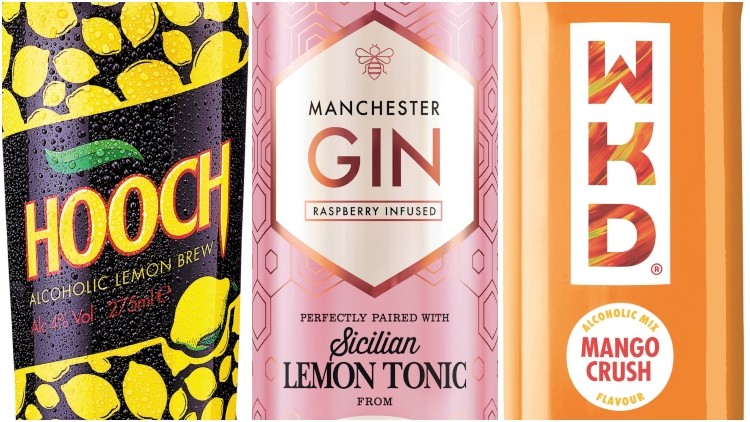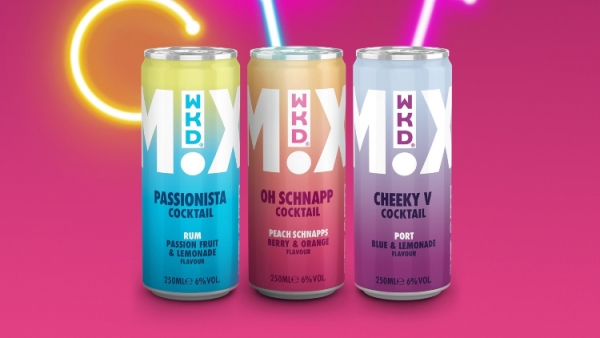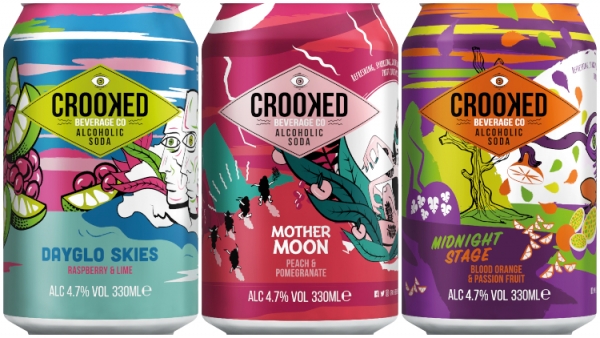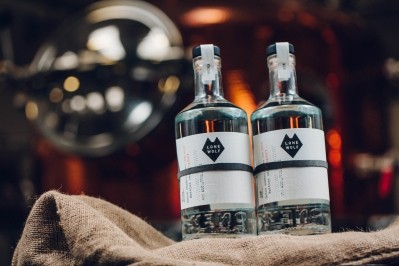What trends are defining the £185m RTD category?

Wine & Spirit Trade Association chief executive Miles Beale explains: “In the past year, we have seen a growing number of spirit mixer drinks, cocktails and wine in a can stockings in our shops and on supermarket shelves.
“This has come partly on the back of the gin boom, which has led to a vast range of different tasting G&T mixes that have proven very attractive to consumers who have increasingly sophisticated palates.
“There is also a substantially greater variety of low and no-alcoholic drink options on the UK market to cater for people who are increasingly looking for lighter, takeaway options.”
Bargain treats
Global Brands marketing director Jen Draper says: “One of the crucial macro trends that will continue to influence consumer purchasing in 2019 is ‘bargain treats’. Consumers want that moment of enjoyment, where they can go out and socialise with friends, but without the guilt of spending too much money.
“RTDs answer this demand and better still, there’s category innovation that’s embracing other big trends including authenticity, premiumisation and shareability.”
Health and wellbeing
Draper adds that two of 2018’s biggest trends – veganism and health and wellness – are expected to grow even further in 2019 and present an extra opportunity for operators to reach customers.
“Conscious consumers are more concerned than ever about what enters their body,” she explains. “Crooked Beverage Co fits the market well at only 47kcal per 100ml and containing all-natural ingredients. Also, lower in sugar than popular fruit ciders, Crooked contains less than 5g per 100ml, catering to the rising 55% of consumers who say they are worried about their sugar intake.
“Having been Vegan Society-accredited, Crooked also appeals to the 3.5m people practising a plant-based diet. The brand recently completed a Veganuary campaign, which reached more than 2.2m consumers and offered the chance to try Crooked for free in the on-trade when they purchased a vegan meal.”
Low and no alcohol?
“There has been a huge increase in consumer demand for low-ABV serves as consumers look to mindful drinking habits,” according to Draper. “Franklin & Sons research showed one in five consumers opt for low or no-alcohol options on big drinking occasions, and with them beginning to increase their spend, the category itself has seen [more than] 785% value increase.“
However, Chris Lewis head of brand marketing, alcohol, at SHS Drinks doesn’t believe this trend will gain much traction in the RTD category. “High-energy or celebratory occasions with groups of friends are what RTDs are all about,” he explains. “As a consequence of this socialising aspect and the sense of ‘fun’ intrinsically associated with RTDs, low-alcohol variants aren’t of significant importance at the moment.
“Yes, moderation is important to consumers overall, but less so on the usage occasions that generally involve RTDs.”
Premiumisation
“Authenticity and premiumisation trends are seeing the creation of RTDs that use natural flavours, are packaged in stylish cans and ready-to-serve drinks pairing premium spirits and mixers,” according to Draper. “This opens up the category to new audiences, which are tired of high-sugar fruit ciders or just looking for something different to drink.
“The style of these ‘new world’ RTDs is already proving a hit with consumers in the off-trade, and we are starting to see them really take off in bars. Cans stand out in fridges and provide both bartenders and consumers with a quick, quality serve, holding huge appeal in busy pubs.”
Young consumers are key
“To succeed, the category needs to remain fresh and relevant,” according to Lewis. “This doesn’t mean that it continually needs to re-invent itself, but what it does need to do is to continually re-introduce itself to the new 18 to 21-year-old consumers as they move up and into the category’s target market.
“These consumers are the lifeblood of the category and WKD works hard to make itself top of mind for this demanding audience."
Moreover, Draper adds: "Continually attracting loyal student customers, while incorporating innovative new flavours, such as the new VK Watermelon, which was crowdsourced through a major social media campaign, VK embraces shareability and authenticity.
“This appeals to a whole new demographic by involving them within the brand story.
“A huge success, VK Watermelon was voted for 33,000 times and viewed by over 6m on the VK website and across social media.”
Social appeal
According to Draper, consumers love to share eye-catching serves on social media, something she suggests operators bear in mind when stocking their bar.
“Social media directly influences purchasing habits; 80% of consumers are likely to purchase an item based on friends’ suggestions and social media is one of the quickest ways to spread the message,” she explains.
“The rose hue of VK Watermelon aligns perfectly with the recent huge popularity of ‘Instagrammable’ pink drinks, with pink gin leading the way growing 751% year on year.
“With a beautifully decorated can, illustrated by Sheffield artist Lisa O’Hara, our unique craft RTD Crooked Beverage Co is the perfect product to attract the Instagram fanatic’s eye. Made using natural flavours and served in 330ml cans designed by a local artist, it looks great in fridges, capturing the eye and curiosity of consumers.”
Sharing is caring
“The growth in multi-serve RTD-based cocktails is a significant trend in the on-trade,” Lewis adds. “These pitchers of sharing cocktails bring theatre to outlets and present a huge opportunity during peak trading periods.
“Licensees and suppliers both need to work hard to place the experience of a night out at the heart of the offering. The focus for profitable growth needs to be on getting consumers out of their homes and into pubs and bars.
“As the actual experience becomes more central to the lives of the 18 to 24-year-old consumer, rather than purely the drinks offering, outlets must ensure that they place the fun factor at the centre of what they do to both attract and retain young adults. These consumers have money to spend but need a reason to do so.”











